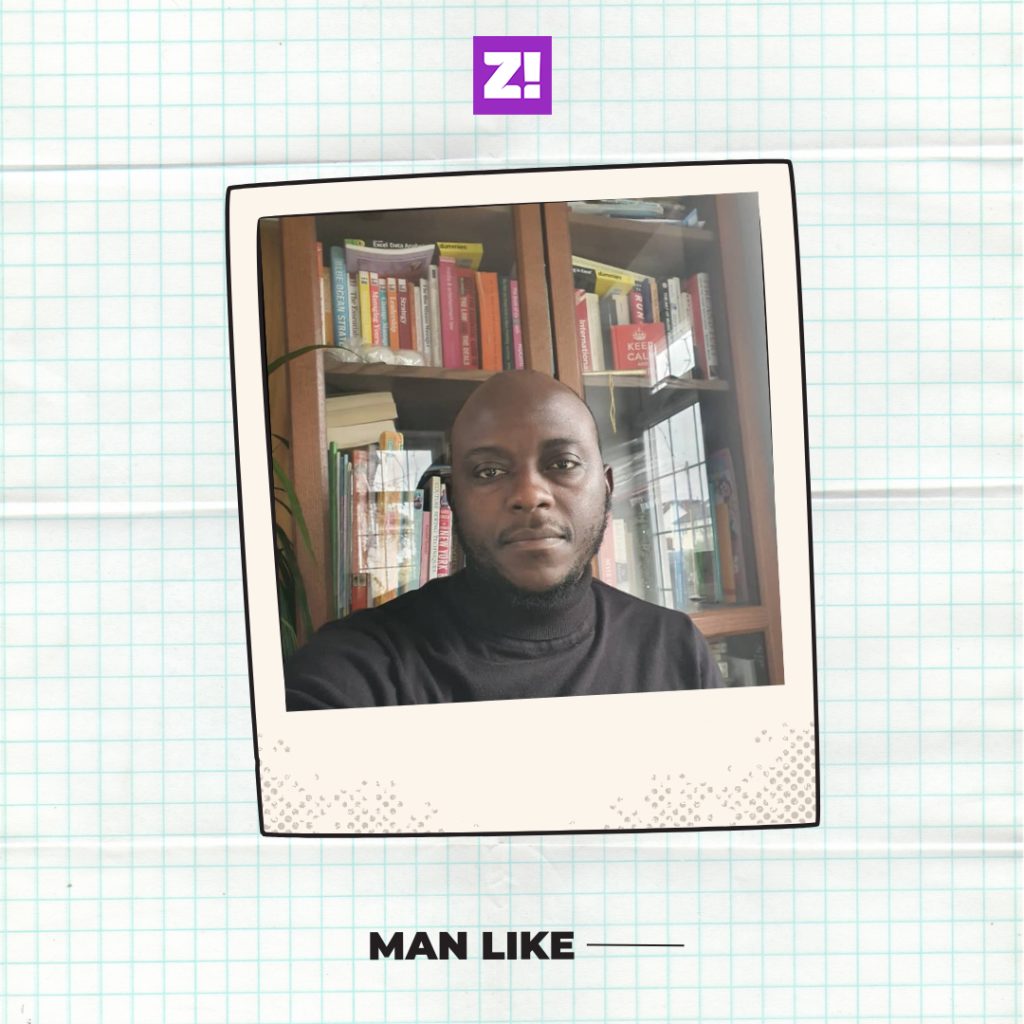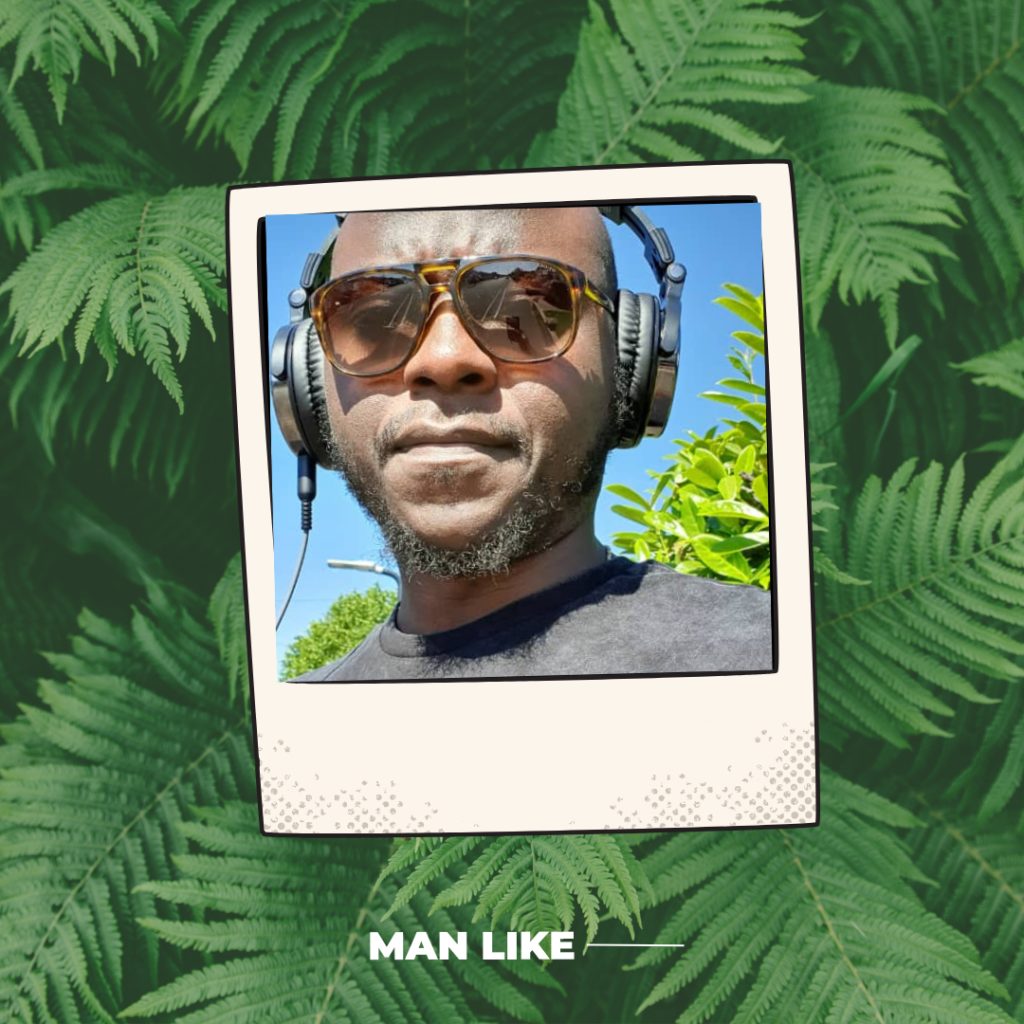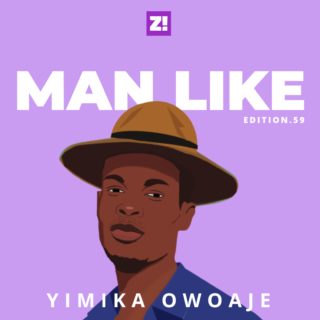What does it mean to be a man? Surely, it’s not one thing. It’s a series of little moments that add up. Man Like is a weekly Zikoko series documenting these moments to see how it adds up. It’s a series for men by men, talking about men’s issues. We try to understand what it means to “be a man” from the perspective of the subject of the week.
Check back every Sunday by 12 pm for new stories in the Man Like series. If you’d like to be featured or you know anyone that would be perfect for this, kindly send an email.

This week’s Man Like is Tex, a father, lawyer and satirist. He talks growing up as the first child with three brothers, raising three girls in a patriarchal society and experiencing grief when he lost his friend.
At what point did you start to feel like you were a man?
I would say when I started driving at 16. That was the point my father started asking about my schedule rather than just make me run errands for him. It was at this point that I had some autonomy.
What was growing up like for you?
I grew up in Ibadan as the first child of four boys. My dad taught at the university and my mom joined him when she got her PhD.
My parents were also agriculturists and I used to help them with their horticulture side hustle, planting flowers and stuff like that. My dad got a contract to supply cashew seedlings to the River Basin Authority, so we would plant all day long. In the evenings, we would play Scrabble which I started playing when I was studying literature. My brothers and I would go swimming and play basketball twice a week at the Nigerian Breweries. A lot of our family were around Ibadan and Ife, so we saw our cousins regularly.
Growing up was fun, but there were challenging times, especially when ASUU went on long strikes and my parents were without pay for six to nine months.

What were your parents like?
While it wasn’t labelled as feminism at the time, my dad was a believer in equal opportunity. Whenever we were with our cousins, it was usually my male cousins who were allocated domestic chores. He never considered anything to be “for the girls.” He’d say, “You guys are the oldest two, so sort it out.” I’m also one of the few privileged ones who, in over 40 years of marriage, never heard his father raise his voice at their mother. Not to say they didn’t disagree, but even when my mom was the more agitated person, he’d just quietly say his piece and lock up. Never heard him shout or say any hurtful words. He’s also very meticulous and organised, so he ended up being the president or the secretary of any association he was a member of and would get re-elected.
My mom was quite supportive. It was never a house where the father was the infallible head and final authority. Before we were 10, my mom had us in the kitchen, helping and cooking. Together, my parents made a very Christian, balanced and egalitarian home.
And now you have your own family.
Yes. I have three daughters aged 7, 11 and 13. The universe has its way of bringing balance because I never had any sisters and now all my children are girls.
How would you describe your relationship?
We’re mostly friends, but you know how it is when children get older. They’re not as cute as they used to be, but we’re still friends. We’ve tried to provide an atmosphere where they feel free to talk to us about anything. Sometimes, they come to me first on stuff that are traditionally “mommy topics.”
In terms of discipline, they’ve always been good girls so we’ve never had to be strict. When they were young, my wife and I decided that discipline would a discussion to understand what was wrong. I don’t want them to have the normal Nigerian upbringing where they think beating is a normal thing so that when they’re adults in their own relationships, they know that violence of any type isn’t acceptable.
Are there any peculiarities of raising daughters?
For one, I’ve not had much trouble in the way of discipline because boys are more boisterous and inclined to do silly things like jump off the bed, trying to fly. Secondly, we live in a world that is kinder to boys and men. Women are more likely to be victims of violence and discrimination, so there are certain concerns that are unique to having female children.
Then again, try as you may, you can’t be there for your children 24/7, and the best you can do is to equip them with tools to navigate those times when they have to be responsible for themselves.
I learned you’re newly qualified as a lawyer in the UK. Congratulations. How did the Nigeria-to-UK move happen?
We were doing okay in Nigeria, but after the results of the 2015 elections were announced, I started having concerns about the future of the country. I wasn’t confident that a good life for my kids in Nigeria wasn’t achievable anymore. That was when I started thinking about relocating. I went to the UK for a quick trip and an opportunity opened up in the line of work I wanted to do, which I promptly grabbed.
Couldn’t have been easy uprooting your life like that. What was the hardest part about leaving Nigeria?
The thing about moving when you’re older is that you’re giving up a lot of things you’ve worked for over the years. It means giving up social and professional capital and moving to a place where you are just an ordinary person starting afresh. You have to requalify in your profession or start a new career. You are giving up the familiarity of home. In Nigeria, your friends, work and the children’s school were in the same general area. You had a support system like people who could watch your kids or domestic help. Abroad, you don’t know that many people and there are many trade-offs to make. In my experience, settling into a new environment takes three to five years, to find your feet and establish new connections.
Did leaving Nigeria affect your relationships with your daughters?
It did. While in Lagos, there were some things we could outsource. For example, we didn’t have to be the one to follow them to the salon or drop them off at their grandma’s. Here, there’s none of that delegation. It allowed me to experience their formative years in closer proximity. Still, the basis of our relationship didn’t change. We’re just as accessible as we were in Nigeria, if not more.
Away from your little girls to your big woman, how did you meet your wife?
Our relationship began in secondary school. I was a year ahead of her and when it was time to graduate, the principal thought that I should pass on my knowledge as president of the press club to someone else, and the person they nominated was my wife. That was how we met.
In December 2005, the school had a reunion party and we met there again. We talked all through that Christmas period. We went for our masters, came back for NYSC and started dating. I think she caught feelings first.

Through moving, having children and hustling your careers, how much has your relationship with her changed?
To some extent. We’ve had children together so our characters have developed not just as lovers but as co-parents as well. When we met, I was a quirky, easygoing and playful kind of guy, and she was the first person I dated who not only didn’t mind those characteristics but liked it.
She’s always encouraging me to pursue my interests. When I told her I wanted to start DJing after turning 40, she encouraged me to give it a shot. Because of her, I’m not afraid of trying new things. She’ll tell you she has also changed my dress sense, but it’s my word against hers.
How about your daughters? How have they changed you?
I wasn’t much of a hard guy before, but since I’ve had my daughters, if I’m watching a movie, for example, and there’s something happening to a child, particularly a girl child, ah, it will catch my chest. So I guess I think I’m more sensitive to the issues that girls and women go through. It’s different when it becomes your responsibility to prepare your daughters to deal with these issues or create a soft landing from them. I’ve always been an expressive and gentle person so being a Girl Dad works out for me quite nicely.
Also, my wife thinks I’m less patient with male children than I am with female children. If a friend’s son is being naughty, I’m more stern with them. I feel like children should be expressive but not unruly. Unruliness gets to me and perhaps boys are generally more unruly than girls.
When was the last time you cried?
One of my best friends died in 2017. We went to university together and his death hit me really hard. Thinking about it now brings a lump to my throat again. That was the last time I cried properly.
How did you cope?
Grief is like a big ball of pain in a box. When you shake the box, it hits the walls and causes more pain. As time passes, the ball gets smaller, so it hits less, but once in a while, something will happen that will push the ball to the wall and the grief washes over you afresh, like when you’re listening to a song you used to bump together or watching a movie you laughed together about. There was a time I couldn’t remember him without crying. Now, I just feel a lump in my throat.
I’m sorry to hear about that. What’s different about being a man in Nigeria?
I think the culture in Nigeria has a prescription for manhood. We’re raised to believe we have to be tough. There’s also the influence of church culture from the mid-90s about the man being the head and the expected deference and submission to you by the women in your life. Compared to being a man outside Nigeria, society is still patriarchal in the sense that men still get paid more than women on average for doing the same work.
Growing up, you hear a lot about how the man is supposed to be the provider but when you talk to people, you find stories about how their mum’s helped not just morally but financially.
Interesting. One last question. What does a relaxing weekend look like for you?
My ideal weekend involves me DJing on Club Isol8 on Friday nights and listening to music while barbecuing on Saturday afternoon. Recently, I picked up cycling so I go for quick rides on Sunday mornings.
Check back every Sunday by 12 pm for new stories in the Man Like series. If you’d like to be featured or you know anyone that would be perfect for this, kindly send an email.
Are you a man who would like to be interviewed for a Zikoko article? Fill this form and we’ll be in your inbox quicker than you can say “Man Dem.”
Want to disappear down a rabbit hole of men-focused content? Click here.
COMPONENT NOT FOUND: donation COMPONENT NOT FOUND: donation



